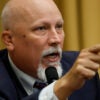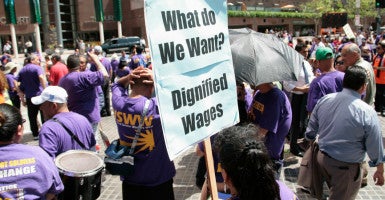Labor unions are pushing to raise California’s minimum wage to $15 an hour with two initiatives competing for voters’ approval.
Two different unions are trying to get questions on the ballot for Californians to have a say on a $15 minimum wage.
“One in four Californians is living in poverty because wages are too low to feed a family. We have to do better by our kids,” Assembly member Roger Hernández, a Democrat, said in a statement.
The state’s minimum wage rose from $9 to $10 at the beginning of the year.
The unions competing to raise it are Service Employees International Union-United Healthcare Workers West (SEIU-UHW) and Service Employees International Union California (SEIU California).
“No state or industrialized democracy has ever raised its real minimum wage to the level unions propose taking California to,” James Sherk, The Heritage Foundation’s research fellow in labor economics, told The Daily Signal.
“If passed,” Sherk said, “this initiative would eliminate hundreds of thousands of jobs in California.”
SEIU California, which represents 15 local unions, proposes that the minimum wage increase to $15 by 2020—with an exception that small businesses would have until 2021. The union is in the process of collecting signatures to get the Raise California’s Wage and Paid Sick Days Act of 2016 to the ballot box.
The union also calls for at least six paid sick days annually for all full-time employees. Its efforts are backed by the nationwide Fight for $15 movement.
“I’m proud to stand by the 700,000 workers of SEIU California in a campaign that gives hope to underpaid workers and honors the backbreaking work they do,” Hernández said.
SEIU California plans to spend $20 to $30 million on a statewide campaign, Associated Press reported.
“The Fight for $15 has won in Los Angeles, won in San Francisco, and I’m proud to join SEIU California and the workers who energize this movement in a campaign to lift up underpaid workers statewide,” state Sen. Isadore Hall III, D-South Bay, said in a formal statement.
The other union, SEIU-UHW, delivered 600,000 voter signatures last week to California election officials in hopes of qualifying to get its measure, the Fair Wage Act of 2016, on the ballot in November.
Los Angeles, San Francisco, Oakland, and Berkeley already have approved minimum wage hikes to $15 that will phase in, AP reported.
Recent data shows that jobs in the restaurant and hotel sectors have seen a decline after minimum wage hikes in some cities—including Los Angeles, Oakland, and San Francisco.
Some analysts say Wal-Mart stores in Oakland and Los Angeles closed because the minimum wages increased.
Gov. Jerry Brown, a Democrat, has voiced concern that raising the minimum wage to $15 would hurt the state’s ability to recover from a recession, the San Francisco Chronicle reported.
Brown said earlier this month that it would cost the state’s general fund $4 billion a year to raise the minimum wage to $15.
Nevertheless, the unions and advocates of a $15 minimum wage push ahead.
“I work so hard to provide for me and my daughter, and that’s almost impossible on the minimum wage in California,” said Maria Sandoval, a cashier from Los Angeles who earns $10 an hour, according to SEIU-UHW.
“I want a better future for my daughter and that’s why I collected so many signatures in my community to get this initiative on the ballot.”
The initiative proposes that California’s minimum wage jump to $11 in 2017, then increase a dollar more every year until it reaches $15 in 2021. For each year after, the wage would be automatically adjusted for the cost of living.
The Fair Wage Act effort is co-chaired by San Francisco Mayor Ed Lee and Oakland Mayor Libby Schaaf, both Democrats.
“This one is moving ahead, it’s farther along, it’s simpler, it benefits 3.3 million workers with no carveouts,” SEIU-UHW spokesman Sean Wherley told Bay Area news station KRON 4. “This is the one that’s going ahead.”
Lt. Gov. Gavin Newsom, a Democrat, has backed both measures.
Heritage’s Sherk cautions against the initiatives:
Unskilled and entry-level workers would get hit hardest of all; any worker who could not raise their employer’s earnings by at least $15 an hour would find themselves unemployable. Prices would rise substantially to cover the higher costs, while firms would explore new ways to replace human labor with machines.































